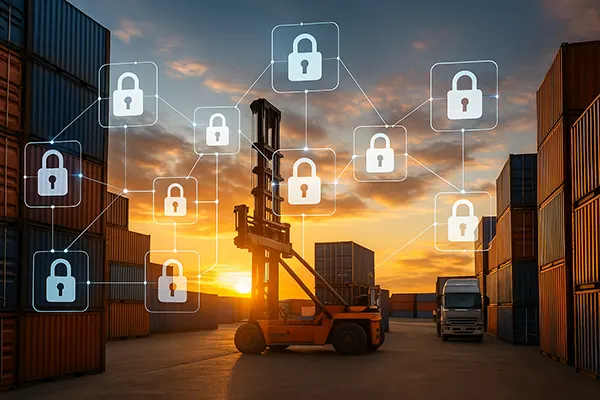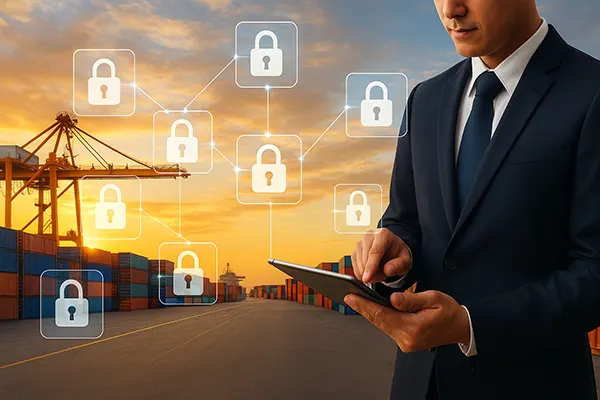The Role of Blockchain Technology in Logistics and Supply Chains

Blockchain technology is no longer a buzzword limited to the financial sector. In recent years, it has become a transformative force in logistics and supply chain management, driving efficiency, security, and transparency. As of February 2025, numerous global companies have integrated blockchain into their operations, achieving measurable benefits in traceability, fraud prevention, and real-time data synchronisation.
Enhanced Transparency and Traceability
One of the most valuable aspects of blockchain in logistics is the enhanced transparency it provides. Every transaction or movement of goods is recorded on a decentralised ledger, ensuring all parties in the supply chain have access to the same immutable information. This eliminates data silos and reduces disputes, delays, and miscommunication.
In sectors like pharmaceuticals and food safety, traceability is critical. Blockchain allows products to be traced back through each step of the supply chain, from origin to delivery. This level of traceability not only improves accountability but also ensures compliance with increasingly strict international regulations.
For example, IBM’s Food Trust blockchain platform is used by retailers like Walmart and Carrefour to trace fresh produce within seconds. This drastically reduces the time needed to respond to contamination events or recalls, improving consumer safety and brand reputation.
Reducing Counterfeits and Fraud
Counterfeiting is a persistent issue in global supply chains, costing the economy hundreds of billions annually. Blockchain can authenticate every product batch and shipment, providing a secure audit trail that is resistant to tampering. By assigning each product a unique digital ID on the blockchain, companies can verify authenticity at every point in the chain.
This is particularly useful in luxury goods, electronics, and pharmaceuticals, where counterfeit items can have serious consequences. By recording certificates, ownership history, and compliance checks on-chain, businesses can reduce fraud and ensure product integrity.
Startups like VeChain have gained traction for offering blockchain-based anti-counterfeit solutions, collaborating with brands and logistics providers to safeguard high-value goods using smart tags linked to immutable blockchain records.
Streamlining Processes Through Automation
Blockchain’s compatibility with smart contracts enables automation across various stages of the supply chain. Smart contracts execute predefined rules when specific conditions are met, removing the need for intermediaries and manual approvals. This reduces administrative overhead, speeds up payments, and cuts operational costs.
Take the example of ocean freight shipping. Traditional documentation involves multiple paper-based contracts, customs declarations, and letters of credit. With blockchain, smart contracts can automate these procedures, reducing processing times from days to hours while minimising errors and fraud.
Major ports such as Rotterdam and Singapore have adopted blockchain to digitise and streamline customs procedures, enabling faster cargo clearance and better coordination among stakeholders.
Improved Inventory and Demand Management
Real-time data provided by blockchain enhances inventory accuracy, helping companies manage stock levels more efficiently. As goods move through each stage, the blockchain ledger is updated instantly, allowing businesses to monitor supplies, detect bottlenecks, and respond to changes in demand.
This visibility helps prevent overstocking and stockouts, reduces warehouse costs, and enables better forecasting. For example, integration of blockchain with IoT sensors enables temperature-controlled tracking in cold supply chains, such as those used for vaccines and perishable foods.
Companies like DHL and FedEx are exploring blockchain-IoT solutions to improve global logistics efficiency, optimise routing, and ensure product quality from source to delivery.

Global Collaboration and Compliance
Global supply chains are complex and involve numerous participants across jurisdictions. Blockchain fosters better collaboration by offering a single source of truth that all parties can trust. This is crucial for multinational companies that rely on timely information exchange between suppliers, carriers, customs, and retailers.
Blockchain also supports compliance with international trade regulations by automating record-keeping and audit trails. Governments and regulatory bodies are increasingly recognising blockchain’s potential in improving trade transparency and tax compliance.
The World Economic Forum and the WTO have recommended the adoption of blockchain for trade digitalisation. Some governments, like Singapore and the UAE, have launched national blockchain strategies specifically targeting logistics and supply chain innovation.
Challenges and Future Outlook
Despite its advantages, blockchain adoption in logistics faces several challenges. These include integration with legacy systems, data privacy concerns, and the need for industry-wide standards. Moreover, blockchain solutions can be costly and require significant initial investment in technology and training.
However, ongoing research and international partnerships are addressing these barriers. As standards evolve and interoperability improves, blockchain is expected to become a staple technology across logistics networks worldwide.
By 2030, blockchain could save the global logistics industry over $150 billion annually in operational costs, according to estimates from McKinsey and Accenture. The technology’s long-term impact will be defined by how well businesses and governments collaborate to scale its adoption.
